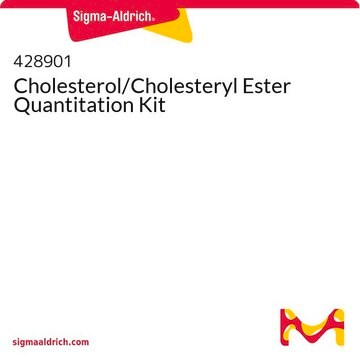CS0005
Cholesterol Quantification Assay kit
Synonym(s):
Cholesterol Assay kit, cholesteryl ester, free cholesterol, total cholesterol
Sign Into View Organizational & Contract Pricing
All Photos(3)
About This Item
UNSPSC Code:
12352202
NACRES:
NA.83
Recommended Products
usage
sufficient for 100 or 400 colorimetric or fluorometric tests
shipped in
dry ice
storage temp.
−20°C
Related Categories
General description
Cholesterol is a lipid that constitutes 20-25% of the structural components of cell membranes. Cholesterol presence assure membrane structural fluidity. Cholesterol also plays a role as an intermediate in several hormones and bile acid biosynthesis and vitamin D. Cholesterol also regulates the functions of the transporters and signaling proteins present on the plasma membrane. The major sites of cholesterol synthesis are the small intestine and liver. Cholesterol circulates in the blood as both the free acid and as cholesterol esters. Increased cholesterol levels are associated with the development of atherosclerosis and cardiovascular diseases. Thus, serum cholesterol regulation has an important therapeutic role.
The Cholesterol Quantification Assay Kit provides a simple and quick procedure for detecting and measuring very low concentrations of Cholesterol. This kit can measure free cholesterol, cholesteryl esters, or total cholesterol (which constitutes both free cholesterol and cholesteryl esters). The cholesterol concentration is determined via a coupled enzymatic reaction. This kit allows for either fluorometric or colorimetric detection, to allow maximum flexibility and a large detection range. The linear ranges are as follows:
The Cholesterol Quantification Assay Kit provides a simple and quick procedure for detecting and measuring very low concentrations of Cholesterol. This kit can measure free cholesterol, cholesteryl esters, or total cholesterol (which constitutes both free cholesterol and cholesteryl esters). The cholesterol concentration is determined via a coupled enzymatic reaction. This kit allows for either fluorometric or colorimetric detection, to allow maximum flexibility and a large detection range. The linear ranges are as follows:
- Fluorescence assay: 0.1–0.5 μg
- Colorimetric assay: 1–5 μg
Application
- Measuring free cholesterol, cholesteryl esters, or total cholesterol in biological samples (For example: Serum and Plasma and tissue culture).
- Measurement can be done either by fluorometric or colorimetric detection.
Features and Benefits
- Highly sensitive, simple and high-throughput assay for measuring free cholesterol, cholesteryl esters, or total cholesterol in biological samples
- User friendly: No need to weigh or calculate needed amounts of reagents on your own
- Supportive calculator (Click here to download a calculator excel file): Will calculate the reagents needed according to your experimental needs, and analyses your results based on your experimental data!
- Quick instruction bench card - to assure your experimental success
- Suitable for both colorimetric and fluorometric detection
- More experiments in one kit - contains sufficient reagents for 100 colorimetric or 400 fluorometric tests.
- Detection time: only 30 minutes
Suitability
Suitable for the detection of free cholesterol, cholesteryl esters, or total cholesterol in biological samples.
Hazard Statements
Precautionary Statements
Hazard Classifications
Aquatic Chronic 3
Storage Class Code
10 - Combustible liquids
Certificates of Analysis (COA)
Search for Certificates of Analysis (COA) by entering the products Lot/Batch Number. Lot and Batch Numbers can be found on a product’s label following the words ‘Lot’ or ‘Batch’.
Already Own This Product?
Find documentation for the products that you have recently purchased in the Document Library.
Customers Also Viewed
Canan Kop-Bozbay et al.
Animals : an open access journal from MDPI, 11(6) (2021-07-03)
This study investigated the laying performance, egg quality, and egg yolk fatty acids (FAs) and cholesterol content in layer hens housed with free access to chicory- and/or white clover-vegetated areas. During a 16-week study, 400 Lohmann Brown hens (32 weeks
Chenguang Zhang et al.
Communications biology, 5(1), 1358-1358 (2022-12-11)
Superparamagnetic nanobeads offer several advantages over microbeads for immunocapture of nanocarriers (extracellular vesicles, lipoproteins, and viruses) in a bioassay: high-yield capture, reduction in incubation time, and higher capture capacity. However, nanobeads are difficult to "pull-down" because their superparamagnetic feature requires
Stephanie B Jilcott Pitts et al.
The Journal of nutrition, 152(1), 107-116 (2021-09-26)
Valid biomarkers of fruit and vegetable (FV) intake are needed for field-based nutrition research. To examine criterion-related validity of pressure-mediated reflection spectroscopy as a proxy measure of FV intake, using plasma carotenoids and self-reported FV and carotenoid intake as primary
Imtiaz Mustafa et al.
BMC complementary medicine and therapies, 22(1), 23-23 (2022-01-27)
Traditional plant-based remedies prescribed to treat diabetes have shown promise in research-based setting. Current research was conducted to examine the antidiabetic and antioxidant effects of methanolic extract of a folk herbal plant Euphorbia helioscopia in a rat model of type
Suneeta Chimalapati et al.
eLife, 9 (2020-08-19)
Pathogens find diverse niches for survival including inside a host cell where replication occurs in a relatively protective environment. Vibrio parahaemolyticus is a facultative intracellular pathogen that uses its type 3 secretion system 2 (T3SS2) to invade and replicate inside
Our team of scientists has experience in all areas of research including Life Science, Material Science, Chemical Synthesis, Chromatography, Analytical and many others.
Contact Technical Service





